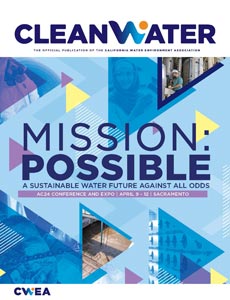Technical Session Proposal
Nutrient Management
Water Recycling: A Cost-Effective Approach for Smaller Agencies to Meet SF Bay Nutrient Load Reductions.
Thursday, April 11, 2024
11:15 AM - 12:05 PM
Location: A5-A6
.jpg)
Logan Smesrud (she/her/hers)
Engineer II
West Yost
Concord, CA
Kathryn Gies
Engineering Manager
West Yost Assocites
Concord, CA- MB
McKay Breuner
Water Process Engineer
Black & Veatch
Lead Presenter(s)
Presenter(s)
Track Lead(s)
Presentation Description: The NPDES permit that manages point-source nutrient loads from municipal wastewater treatment plants discharging to the San Francisco Bay, also referred to as the Nutrient Watershed Permit, is due for its 5-year renewal and third reissuance in 2024. With the recent harmful algal blooms in the Bay occurring in 2022, the anticipated regulatory requirements that are expected to be forthcoming in this third Nutrient Watershed Permit have many agencies looking ahead and planning for nutrient load reduction requirements. Although it is unclear how upcoming nutrient limits will be set and how they will differ between large and small agencies, these nutrient load reduction requirements are sure to have significant financial implications. Smaller agencies that do not have the same economic resources as larger agencies for capital improvement projects involved in conversion to nutrient removal facilities may need to consider alternative approaches for nutrient load reductions. That is where water recycling comes in, presenting a cost-effective strategy for offset of nutrient loads sent to the Bay, while also generating revenue.
This talk will explore how water recycling programs can be a cost-effective approach to meeting nutrient limits when other nutrient reduction methods may be cost-prohibitive. The discussion will include specific examples from two small agencies that discharge to the San Francisco Bay, and how current feasibility projects are evaluating alternatives for nutrient reduction around the unknown timeline of nutrient limits being set. Assessment and financial evaluations of likely nutrient load reductions that can be achieved by these agencies will be presented, including how water recycling fits into that analysis. Insights from Regional Water Board discussions will also be included to give context to what the third Nutrient Watershed Permit may introduce.
This talk will explore how water recycling programs can be a cost-effective approach to meeting nutrient limits when other nutrient reduction methods may be cost-prohibitive. The discussion will include specific examples from two small agencies that discharge to the San Francisco Bay, and how current feasibility projects are evaluating alternatives for nutrient reduction around the unknown timeline of nutrient limits being set. Assessment and financial evaluations of likely nutrient load reductions that can be achieved by these agencies will be presented, including how water recycling fits into that analysis. Insights from Regional Water Board discussions will also be included to give context to what the third Nutrient Watershed Permit may introduce.
Learning Objectives:
- Describe the timeline and implications of the forthcoming nutrient load reduction requirements to the SF Bay.
- Discuss the financial implications of nutrient load reductions on smaller agencies.
- Explain how recycled water programs can offset nutrient loads sent to the SF Bay while also generating revenue.

